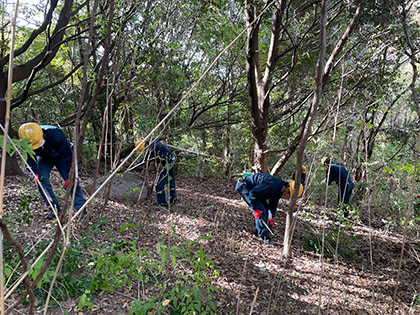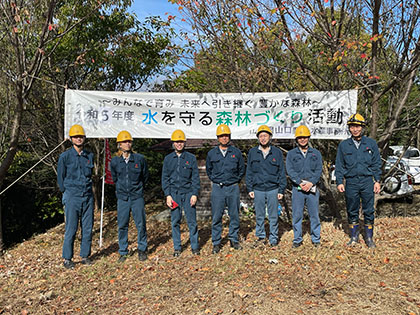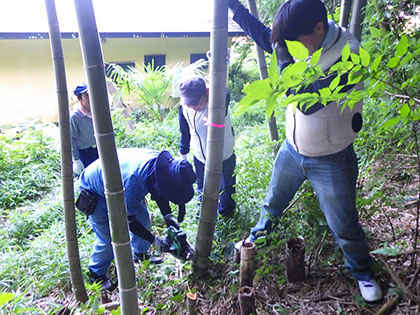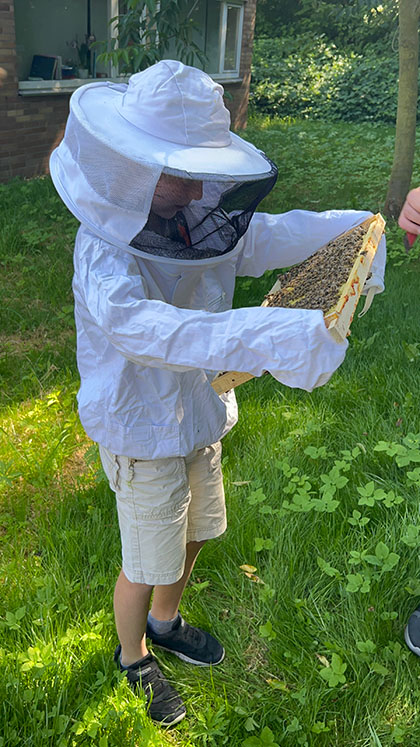Biodiversity
Policy
Tokai Carbon Group Biodiversity Policy
The Tokai Carbon Group recognizes that protecting the global environment is one of the most important management issues. In accordance with the "Environmental Philosophy" and "Environmental Policy" shared by the entire Group, we are committed to fostering harmony between our business activities and the environment by considering the impact of our operations on ecosystems and biodiversity. Through the implementation of the following policies, we would like to contribute to the realization of a sustainable society.
- Understanding and evaluating impacts, dependencies, risks and opportunities
We will strive to understand the impacts and dependencies our business activities have on biodiversity, while identifying and assessing the risks and opportunities associated with our business activities.
- Contributing to Nature Positive through business activities
We will contribute to Nature Positive by avoiding and reducing the negative impact of our business activities on biodiversity, while increasing the positive impact through our products and services.
- Promoting educational activities
We will provide appropriate education and training to our Group executives and employees, enabling them to deepen their understanding of biodiversity and its importance.
- Collaboration with stakeholders
We will work in collaboration with our stakeholders, including employees, customers, business partners, shareholders, and local communities, to implement this policy.
- Information Disclosure
We will proactively disclose information about our initiatives based on this policy.
Initiatives
Information disclosure in line with TNFD recommendations
Having upheld “Harmony with the global environment” as one of our materialities, we have focused on initiatives including reducing greenhouse gas emissions and water consumption, minimizing waste, and reducing various pollutants. In light of the TNFD Final Recommendations version 1.0 published in September 2023, we have reorganized our initiatives to align with TNFD’s disclosure recommendations.
■Governance
At Tokai Carbon, the Board of Directors regularly monitors the status of company-wide sustainability initiatives and sustainability-related risks, including those related to biodiversity. The Risk Management and Compliance Committee under the Board of Directors, conducts assessments of material risks affecting the Company, including climate change risk, and reports the findings to the Board of Directors on a quarterly basis. In addition, the Sustainability Committee and the Carbon Neutral Committee, both of which are chaired by the President, discuss the formulation of policies and progress toward targets for addressing sustainability issues, including carbon neutrality and biodiversity, and refer and submit reports to the Board of Directors on a quarterly basis.
■Risk and impact management
To mitigate the risk of losses in business operations, each department implements daily risk management in accordance with rules and policies related to accounting and financial, business partner, export, environmental and disaster prevention, quality, information security, and investment management. In addition, the Risk Management and Compliance Committee meets in principle every quarter to discuss important matters related to risk and compliance. Based on the results of these discussions, the Committee provides advice to relevant parties and reports to the Board of Directors and other management bodies in an effort to identify risks and improve risk management. The Risk Management and Compliance Committee discusses the Company's major risks, including climate change risks, and the status of responses to those risks, and reports to the Board of Directors on a quarterly basis.
■Strategies for natural capital and biodiversity
In order to understand the dependence and impact on natural capital and biodiversity in our business, we conducted an analysis in accordance with the approach proposed by TNFD.
- Selection of the scope of analysis
We evaluated the degree of dependence and impact on natural capital and biodiversity of each business using the natural risk assessment tool (ENCORE) and confirmed that the Carbon Black business had a relatively high degree of dependence and impact. Additionally our value chain was found to have highly dependency and impact on ecosystem services related to water resources.
- Identification of dependencies, impacts, risks and opportunities
We identified two Carbon Black business production sites as priority areas requiring significant consideration for biodiversity. Following the approach advocated by TNFD, we analyzed the dependencies, impacts, risks, opportunities, and countermeasures related to the manufacturing process of this business in these areas.
The results of the analysis are as follows: - Countermeasure
In response to these risks, we will avoid and reduce the negative impact of our business activities on biodiversity by reducing CO2 emissions, water consumption and pollutant emissions.
[Dependencies and impacts on natural capital]
Scroll horizontally to view the whole table
| Dependencies | Carbon Black manufacturing and cooling processes consume a large amount of water, making the business dependent on water resources |
|---|---|
| Impacts | Beyond greenhouse gas emissions, the carbon black business (in-house operation) may have an effect on nature through discharge of wastewater, waste, and chemical substances generated in the manufacturing process, potentially leading to air, water, and soil pollution. |
[Risks and opportunities related to natural capital]
Scroll horizontally to view the whole table
| Risks | Response (opportunity) |
|---|---|
|
・Increased risk of natural disasters due to deterioration of the natural environment ・Physical risks associated with water resources, such as water shortage and water pollution ・Risk of worsening reputation and litigation from communities and stakeholders if plant operations degrade the natural environment surrounding the plant ・Risk that tighter laws and regulations related to nature will affect plant operations |
・Reduction of CO2 emissions ・Reduction of water consumption and promotion of recycling ・Reduction of NOx, SOx and VOC emissions ・Promotion of industrial waste recycling ・Development of low-environmental-impact products |
■Indicators and targets
Our sustainability targets for fiscal 2025 are as follows:
Scroll horizontally to view the whole table
| Targets | Scope | |
|---|---|---|
| Reduce GHG emissions | Reduce CO2 emissions by 25% (VS 2018) before 2030 and achieve carbon-neutral by 2050 | Consolidated |
| Reduce pollution |
・NOx emissions: 3,330 t/y or less (2% reduction against 2021) ・SOx emissions: 17,670 t/y or less (5% reduction against 2021) ・VOC (Volatile Organic Compounds): 265 t/y or less (5% reduction against 2022) |
Consolidated |
| Maintain zero environmental claims against the Company (contamination of air, water, etc.) | Consolidated | |
| Change 40% of product shipping packages to eco-friendly ones by end of 2025 | Tokai COBEX | |
| Reduce water consumption | Water consumption of 8.9 million m3/year or less (1% reduction against 2021) | Consolidated |
| Recycle waste | Recycling rate of 51% or higher (1% increase against 2021) | Consolidated |
| Utilization of sustainable resources | Ensure rCB*6 secondary treatment pilot plant is operational by the end of 2027 | Carbon Black Division |
- * rCB(recovered Carbon Black): Recovered carbon black extracted from polymer products such as end-of-life tires containing rubber.
Examples of ecosystem conservation activities
Each business site participates in various activities to contribute to the conservation of local ecosystems.
■Water conservation forestation activities (Hofu Plant)
We participate in the “Water Protection Forest Creation Activity” organized by the Yamaguchi Prefecture Agriculture, Forestry and Fisheries Department. We contribute to the conservation of water resources by maintaining forests, which are the source of industrial water, indispensable to our corporate activities.


■Taketoyo-cho Sluice Gate South Waterfront green area cleanup (Chita Plant)
We contribute to the beautification of the environment by participating in cleanup activities in the green area around the Chita Plant.
■Satoyama conservation project through extermination of alien species (Shonan Plant)
We contribute to the conservation of the ecosystem by participating in activities aimed at eliminating alien species that are necessary to protect the Satoyama (undeveloped woodland near populated area) ecosystem.

■Contribution to the conservation of water quality in North Carolina, U.S. (TOKAI CARBON GE LLC)
We worked with Charlotte-Mecklenburg Strom Water Services to prevent surface water pollution in order to preserve local water quality and protect the ecosystem.
■Ecosystem workshop for elementary school students (Tokai COBEX Group)
We held a workshop to help children understand the importance of ecosystems and raise their awareness of environmental protection.



